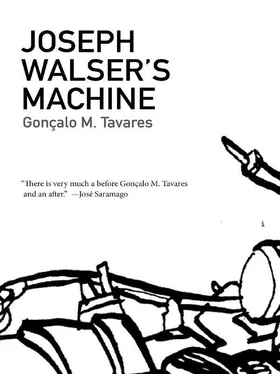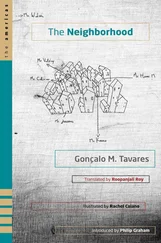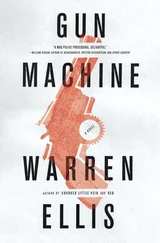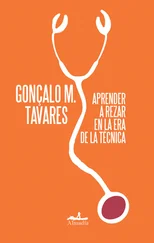His thoughts had already embarked down another path, they had been normalized, if we can put it that way. The shock of coming upon a corpse in the middle of the street had worn off. Walser’s organism had returned to normalcy.
He was now observing different details, his attention was elsewhere: his collection didn’t contain a single piece that had belonged to a corpse that he’d seen with his own eyes. And there it was: the corpse. And one with a belt; a belt that certainly had a metal buckle. Walser was now concentrated on how to steal the belt from the corpse, right there, in the middle of the street.
He looked around: nobody there. He bent over impulsively and pushed the corpse onto its right side; it was easy; he pushed harder and was able to roll the corpse over completely. Its face had been disfigured by a bullet, but Walser barely even glanced at it. He stood up again, straightened his back, and looked around. Someone was walking toward him from the end of the street. Walser stood still.
The corpse was now face up. One side of his face was deformed, but there were still some individual features left. Walser looked at the dead man’s face. A stranger, that one.
Meanwhile, the person at the end of the street had walked over to him.
“It never stops,” said the man.
Walser didn’t respond, and the man bent over to take a closer look at the corpse’s face.
“A bullet,” he said. “Do you know him?”
Walser responded that he did not.
“May I ask you for a favor,” Walser asked suddenly. “It’s his belt. Can you help me?”
“That’s stealing,” said the man. “I’m a soldier.”
Walser was now frightened.
“This man is dead,” he said.
“Even so. It’s theft of private property.”
The two of them were alone. They remained quiet for a few seconds.
“Don’t be afraid. I’ll help you,” said the man, finally.
“… just need you to lift the torso,” said Walser.
Walser bent down and began to unfasten the belt. The other man also leaned over the corpse and lifted its torso a few inches off the ground, so that Joseph could pull the belt through its loops. But the man soon let go of the body, without warning.
“It’s heavy.”
They both stood up; someone was coming.
It was a woman. She didn’t stop. On the contrary: she picked up her pace.
The two of them bent over again, and again the man lifted the torso of the corpse off the ground. Walser pulled on the belt and finally removed it. The man sat the corpse back down. “It’s heavy,” he repeated, while brushing off his hands.
Walser thanked him and rolled up the belt.
“What’s your name?”
“Joseph Walser,” Walser replied, embarrassed.
“Hinnerk Obst,” said the other man, introducing himself.
The two men shook hands.
For the last few days, Joseph Walser had sensed something strange going on with his wife. They spoke very little; communication between them had always been difficult — neither of them was much of a talker, and what did they have to say to each other anyway? However, it had grown worse over the last three days. During that time, Margha had said, at most, and in a hushed voice, “yes,” here or there, in response to concrete requests.
Joseph, however, had been locked in his study for hours, excited. He had already removed the buckle from the rest of the belt, which he’d thrown in the trash, drawn the sketch of the piece in his notebook, and recorded all its measurements. Under the column marked “location,” Walser had written: Dokrement Blukn Street; under “time” he’d written: 7:30 p.m.; under “function”: buckle belonging to a black leather belt (to fasten/unfasten it); and under “Other Particularities” he’d written, with a certain pride: “Taken off the body of a corpse, with the assistance of Mr. Hinnerk Obst.”
Joseph Walser shut the door to his study, locking it with his key from the outside, as usual, and walked into the living room: Margha was crying.
“What’s the matter?”
Margha wiped her face; and after a brief silence, softly said:
“It’s Klober. He said he doesn’t want me anymore.”
The foundations of any event are fragile, even war. There is no fact so pure that it can become definitive or put an end to History: what appears to be in flux might seem to proceed upon what seems to be in a state of permanence, but the invisible foundation that supports even the most important moments is the first to shake, and signs of change soon make their way into the material world.
As the weeks passed by it became clear that the war would have to come to an end. It was as if, we might say, obscenely, an aesthetic saturation had been reached: at first, the particular way in which the city had been fragmented by the conflict became a little irritating to see, and then, little by little, it became intolerable. Thus, the necessity of ending the war wasn’t due to the return of some moral imperative or the recurrence of old resolutions: it was only that the repetition of its images had become excessive; the intense, fearful excitement people felt on seeing a corpse had now waned; explicit violence had abandoned its central place in narratives and had become integrated, now in an objective, neutral way, into written reports. The way people said “one more” while standing in front of a corpse had become more indicative of violence than the corpses themselves — lying crumpled in the street, mere matter divested of any trace of that humanity which had now disappeared in the same instantaneous and mysterious way that it had first arrived, in the midst of the person’s family, on the day it was born. The desire for war was thus demolished, day after day, by this purely verbal construction, by this phrase that only existed in the world of language, without any visible connections to the world of objects: “One more.” It was this “one more” that was going to end the war. Since the war had just been repeating itself for months, this feeling of “I’ve seen it all already” began to hold sway over even the most naïve and least clever people in the city.
The war, when it first arrived, had quickly become the only topic of conversation, and it was inserted into every form of human excitation, so to speak, populating the cities — even those intimate, private excitations shared by a man and his wife were dominated by this seemingly global form of excitation, by the excitation of the entire country. And for that reason the war was welcomed as a stimulating surprise, there’s no other way to describe it, something that brought fear and obvious suffering, yes, but, in truth, it was hoped that these would remain tangential, indirect consequences. And, furthermore, the war satisfied a basic human need: intensity. Everything became more intense, from a simple glance at a map of the country — to find out where the soldiers were then marching — to the city streets, the shops, the houses, one’s kitchen utensils: everything, from the universal to the miniscule, from the most public garden to the most personal chair, everything became more intense.
A mere knife in the kitchen possessed intensity. At the beginning of the war, whenever anyone picked up a household knife, for entirely peaceful purposes, fleeting energies would begin to flow, bestowing a certain new gravity upon this simple act and brutally amplifying one’s otherwise monotonous or barren existence. However, this excitation faded with repetition — as might happen with any book or film that one has read or seen numerous times. How does one retain the anxiety of the moment when one is diving into the first page for the umpteenth time? What had taken place in the city, the streets, the houses, in the entire country, and with the kitchen knives too, what had taken place was something similar to aesthetic exhaustion; so similar that the two become confused. The war was starting to bore everyone; first those who were least involved, the ones who had the least to win or lose, and later, little by little, even those closest to its center, those who were stronger and, therefore, more ambitious. Ambition, although it was one of the last qualities to succumb, also became boring and, from a certain point onward, was also seen as a repetition: “I want more, one more time.” And when tedium reached the strongest, those who could either win or lose the war, it marked the beginning of the end for all those things that had, for some time now, been repeating themselves to excess. Little by little, the signs became more pronounced, encroaching upon the realm of the visible, anxious to make their material entrance into the world. The end of the war was drawing near.
Читать дальше












